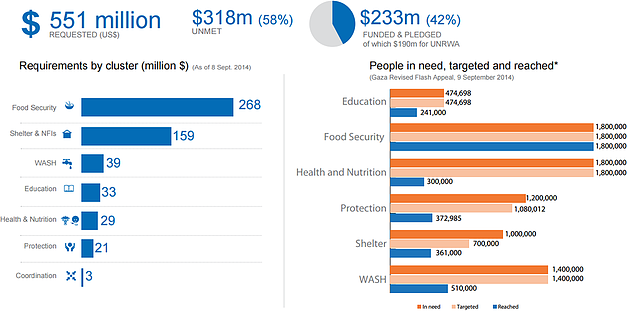Humanitarian Appeal for $551 million to address the most urgent needs
Most organizations remain largely unfunded
In early September, the Humanitarian Country Team (HCT) launched its Gaza Crisis Appeal outlining the joint strategy of the humanitarian community, including UNRWA, to respond to the current crisis in the Gaza Strip. The appeal requests $551 million to carry out 108 projects, implemented by 54 partners, including 13 UN agencies.

To date, humanitarian partners have mobilized some $233 million, which is 42 per cent of the sum requested. Approximately 85 per cent of these funds have been pledged to UNRWA, leaving the remaining organizations severely underfunded. Moreover, some $10.83 million of funds directed to non-UNRWA partners have come from the Central Emergency Response Fund – a pool of donor funds administered by OCHA – rather than directly from member states.
The Emergency Response Fund (ERF) administered by OCHA is an additional funding mechanism that began to process project applications related to the Gaza emergency from the first week of the crisis. By the end of August, the ERF had approved 13 projects for a total of $3.1 million. Several donors have come forward with pledges for the ERF: Denmark, Germany, Sweden, Italy, Switzerland and Ireland have pledged a combined sum of $4.45 million.
Many of the unfunded organizations seek to address the basic needs of the most vulnerable people in Gaza, including supporting access to basic social services that are beyond UNRWA’s mandate, alongside support to refugees. Those needs include the clearance of at least 7,000 explosive remnants of war; the repair of water infrastructure supplying some 450,000 people; improving access to public primary health care for the most vulnerable; early detection and treatment of severe cases of stress, anxiety, and child abuse; and support to 27,000 farmers, breeders, herders, fishermen and their families who sustained losses and damage. The inability to address basic needs due to current funding gaps may exacerbate frustrations and social tensions within the population of Gaza.









